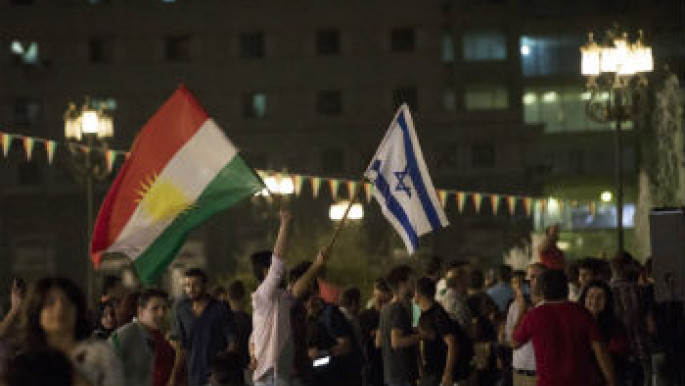Worst fears allayed as Kurdish referendum passes peacefully
Iraqi Kurdistan's residents went to the polls on Monday to decide whether to remain part of Iraq or form their own country - the first Kurdish nation state in the world. Despite fears, the vote was carried out very smoothly, even in the disputed city of Kirkuk.
Noon on Monday in Erbil was like any other. In the Kurdish capital's iconic citadel, said by Kurds to be the oldest continuously inhabited urban centre in the world, the scene was still quiet in the early afternoon. Aside from Friday, when the numerous shops in the citadel's bazaar close, it is usually a bustling and crowded area.
Early afternoon on Monday was an exception, as people headed in droves to polling stations.
Voters with purple ink on their fingers invariably said they voted yes. Many went to vote in traditional garb. Flags and enormous banners, many showing pictures of leading Barzani allies, were ubiquitous in the streets of Erbil - even on people's cars, in the run-up to the referendum.
 |
Kurds abided by instructions from Governor Najmaldin Karim who told them not to discharge their weapons in celebration upon voting |  |
The threats from Baghdad and Iraqi Kurdistan's immediate neighbours didn't seem to worry voters. Some were wary, but most were adamant that this was their right and they were going ahead with it regardless.
 |
|
| Israel had been the only country to support the referendum [Getty] |
Kirkuk, with its ethnically mixed population, also had a smooth voting day.
Kurds abided by instructions from Governor Najmaldin Karimwho told them not to discharge their weapons in celebration upon voting, clearly mindful that doing so could have potentially led to violence with the Arab or Turkmen minorities in the city - some of whom have strongly opposed the prospect of Kirkuk becoming part of an independent Kurdish state.
Read more: The governor Baghdad wants to remove from office
The only real worrying developments surrounding the referendum came from outside the region.
Baghdad immediately demanded that the Kurdistan Regional Government (KRG) hand over its airports and border crossings to federal authorities. The Iraqi parliament also voted on Monday to send the army into the territories disputed between Baghdad and Erbil, an area which includes Kirkuk.
Iran closed its airspace to Kurdistan at the behest of Baghdad. Amateur video published on social media purportedly showed Iranian jet fighters flying near the autonomous region's frontier.
On the day of the referendum, Turkish President Recep Tayyip Erdogan threatened to block oil exports from Kurdistan, a move which could devastate the highly oil-dependent, and currently cash-strapped, region - since its only oil pipeline to the outside world runs through Turkey.
 |
Iraqi Kurdistan's geographical position is extremely precarious; the region is completely landlocked and if its neighbours so wished, they could effectively strangle the region economically.
Kurds have bitter memories of the 1990s when they faced a double embargo, one as a result of the United Nations sanctions on Iraq and the other from Baghdad, which wanted to destroy the region's then nascent autonomy.
Some Kurds were so desperate back then they even ran the risk of disarming land mines strewn across their region just to sell the scrap metal in order to feed their families.
The Israeli government, the only government to openly support Kurdish independence, kept quiet on Monday under instruction from Prime Minister Binyamin Netanyahu, wary of irking Turkey.
The United States also opposed the referendum, arguing that it would in some way distract from the fight against what is left of the IS group in Iraq. Nevertheless, Washington has already made clear that its relations with the region "will not change".
 |
Kurdish President Masoud Barzani has expressed his displeasure that the international community would not grant the Kurds their right to pursue independence after the immense sacrifices the Peshmerga made to help defeat IS |  |
The last time the Kurdish leadership wanted to hold a referendum on independence was just before November 2016, when the outcome the US presidential election was announced. The poll never materialised; a specific date never set.
Instead, Iraqi Kurdistan helped Baghdad and the US-led coalition begin their operation against IS in Mosul. Kurdish Peshmerga fighters secured key routes for the Iraqi army to mount a successful, if devastating, operation.
Kurdish President Masoud Barzani has expressed his displeasure that the international community would not grant the Kurds their right to pursue independence after the immense sacrifices the Peshmerga made to help defeat IS. Today, in IS's last major stronghold in Iraq, Hawija, the Peshmerga have similarly helped Iraqi forces.
Now that the referendum is complete, with the final counts likely to result in an overwhelming yes vote, it's unclear if those attempting to intimidatethe region will live up to their threats, or wait and see how to deal with Erbil now that its people have declared their desire for self-determination.
Paul Iddon is a freelance journalist based in Erbil, Iraqi Kurdistan, who writes about Middle East affairs.
Follow him on Twitter: @pauliddon





 Follow the Middle East's top stories in English at The New Arab on Google News
Follow the Middle East's top stories in English at The New Arab on Google News


